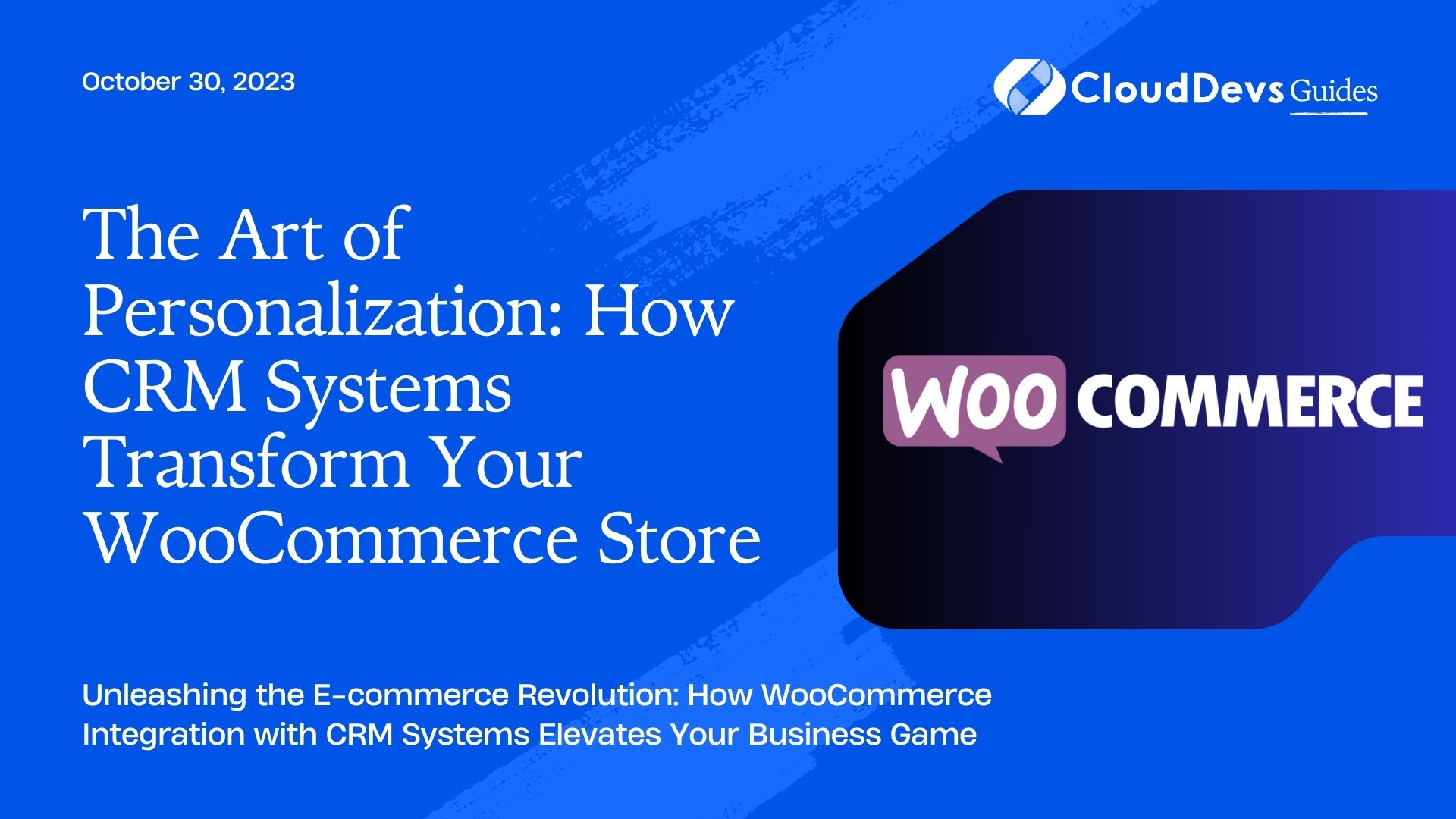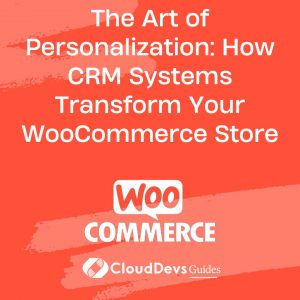The Art of Personalization: How CRM Systems Transform Your WooCommerce Store
In the world of e-commerce, maintaining strong customer relationships is crucial for long-term success. Customer Relationship Management (CRM) systems are powerful tools that help businesses manage interactions with their customers effectively. When integrated with e-commerce platforms like WooCommerce, CRM systems can revolutionize the way you engage with your customers, enhance marketing efforts, and ultimately drive more sales. In this blog post, we will explore the benefits of WooCommerce integration with CRM systems and provide real-world examples to illustrate their potential.
Why Integrate WooCommerce with CRM?
1. Enhanced Customer Insights
Integrating WooCommerce with a CRM system enables you to gather comprehensive customer data, including purchase history, browsing behavior, and contact information. This data can help you segment your customer base, allowing for highly targeted marketing campaigns. For instance, if you notice that a group of customers frequently purchases a specific product, you can create personalized promotions or recommendations tailored to their interests.
Example: An online clothing store integrated their WooCommerce store with a CRM system. By analyzing customer data, they identified a segment of customers who regularly bought winter coats. They then sent personalized email promotions for winter coats to this segment, resulting in a significant increase in sales during the winter season.
2. Streamlined Marketing Automation
CRM integration with WooCommerce allows for automated marketing workflows. You can set up triggers based on customer actions, such as abandoned carts, product views, or previous purchases. Automated emails and follow-ups can be sent to re-engage customers and recover potentially lost sales.
Example: A beauty product retailer integrated their WooCommerce store with a CRM system to address cart abandonment. When a customer added items to their cart but didn’t complete the purchase, an automated email was sent with a reminder and a special discount code. This reduced cart abandonment rates and increased conversions.
3. Improved Customer Support
CRM systems provide a centralized platform for managing customer inquiries and support tickets. WooCommerce CRM integration allows customer support teams to access customer order history and preferences, enabling them to provide more personalized and efficient assistance.
Example: A tech gadget store integrated their WooCommerce platform with a CRM system. When customers contacted their support team with product-related questions, the support agents could quickly access the customer’s purchase history and recommend compatible accessories or provide troubleshooting tips, leading to higher customer satisfaction.
4. Sales Team Empowerment
For businesses that have both online and offline sales channels, integrating WooCommerce with a CRM system can provide a 360-degree view of customer interactions. This empowers sales teams to have more meaningful conversations with customers, as they have access to their entire history, including online purchases.
Example: A furniture retailer integrated their WooCommerce store with a CRM system used by their sales team in physical showrooms. When a customer visited a showroom, the sales representative could view their online purchases and preferences, making it easier to recommend complementary furniture pieces and close sales.
5. Data Synchronization
Integration between WooCommerce and CRM systems ensures that customer data is synchronized in real-time. This means that any changes or updates made in one system are reflected in the other, reducing data inconsistencies and manual data entry.
Example: An online electronics store integrated WooCommerce with their CRM system, which also connected to their accounting software. This streamlined their order processing, as sales data from WooCommerce was automatically updated in their CRM and accounting systems, eliminating the need for manual data entry and reducing errors.
Popular CRM Systems for WooCommerce Integration
1. HubSpot CRM
HubSpot offers a free CRM that integrates seamlessly with WooCommerce. It provides tools for marketing automation, email marketing, and customer support, making it a versatile choice for e-commerce businesses of all sizes.
2. Salesforce CRM
Salesforce is a powerful CRM solution that offers robust features for e-commerce integration. It allows businesses to create highly customized workflows, automate marketing campaigns, and provide excellent customer support.
3. Zoho CRM
Zoho CRM is known for its user-friendly interface and offers WooCommerce integration through plugins. It provides tools for lead management, sales automation, and analytics to help e-commerce businesses grow.
4. Mailchimp
Mailchimp, primarily known for email marketing, also offers CRM capabilities. It integrates seamlessly with WooCommerce and provides features for email marketing automation, audience segmentation, and customer insights.
5. ActiveCampaign
ActiveCampaign offers a CRM and marketing automation platform that is suitable for e-commerce businesses. It allows you to create automated customer journeys, track website interactions, and personalize marketing campaigns.
Conclusion
Integrating WooCommerce with CRM systems is a strategic move for e-commerce businesses looking to enhance customer relationships, streamline marketing efforts, and boost sales. The benefits of this integration are well worth the investment, as illustrated by real-world examples of businesses that have successfully leveraged CRM systems in their e-commerce operations.
Whether you’re looking to gain deeper customer insights, automate marketing workflows, provide exceptional customer support, empower your sales team, or synchronize data seamlessly, WooCommerce CRM integration is a game-changer for your e-commerce success. Choose the CRM system that aligns with your business needs and embark on the journey of creating meaningful and profitable customer relationships.
Table of Contents







